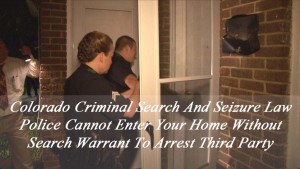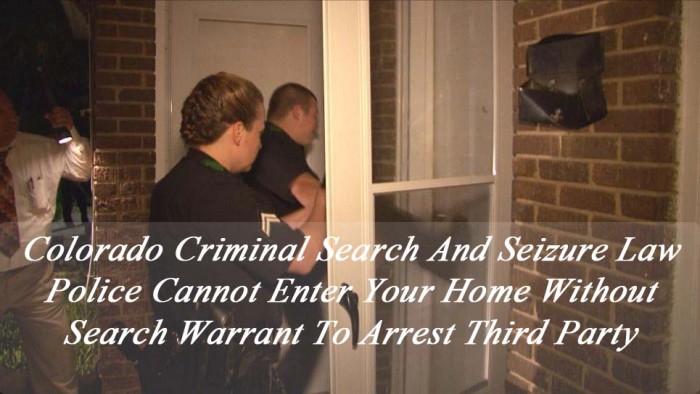




Colorado Criminal Search And Seizure Law – Police Cannot Enter Your Home Without Search Warrant To Arrest Third Party
By H. Michael Steinberg Colorado Criminal Defense Lawyer – Attorney
 Colorado Criminal Search And Seizure Law – Police Cannot Enter Your Home Without Search Warrant To Arrest Third Party For The public’s understanding the difference between an arrest warrant and a search warrant is complicated. An arrest warrant and a search warrant must both be supported by probable cause but the interests protected by these two different types of warrants are different.
Colorado Criminal Search And Seizure Law – Police Cannot Enter Your Home Without Search Warrant To Arrest Third Party For The public’s understanding the difference between an arrest warrant and a search warrant is complicated. An arrest warrant and a search warrant must both be supported by probable cause but the interests protected by these two different types of warrants are different.
Here Is The Law:
§ 16-3-102. Arrest by Peace Officer
(1) A peace officer may arrest a person when:
(a) He has a warrant commanding that such person be arrested; or
(b) Any crime has been or is being committed by such person in his presence; or
(c) He has probable cause to believe that an offense was committed and has probable cause to believe that the offense was committed by the person to be arrested.
The arrest warrant is based upon a Judge finding probable cause to believe that the subject of the warrant has committed an offense. The arrest warrant is intended to protect a person from an unreasonable seizure.
The search warrant is based a Judge finding probable cause to believe that evidence may be located by a search of a particular place. The arrest warrant safeguards a person’s interest in the privacy of his home and possessions against an unjustified intrusion of the police.
Each warrant authorizes the police to do something very different. The question addressed in this article is this: What safeguards must be overcome before the police can enter your home with an arrest warrant for a third person believed to be in the home. Let’s be clear here – arrest warrants authorize the government to make an arrest right to arrest someone anywhere that person can be found.
But there are limitations on that rule.
The Payton Rule – Two Prongs Must Be Met Before The Police May Enter Your Home With Only An Arrest Warrant
The Fourth Amendment to the United States Constitution and article II, section 7 of the Colorado Constitution proscribe all unreasonable searches and seizures. Any search and seizure inside a person’s home without a warrant is presumptively unreasonable unless justified by one of the well-established exceptions to the Warrant Clause of the Fourth Amendment.
In a case known as Payton vs. New York – the United States Supreme Court established the constitutional standard for police entry into a residence to execute an arrest warrant in search fo a third party.
The “two-pronged” Payton standard is derived from the Fourth Amendment to the United States Constitution and article II, section 7 of the Colorado Constitution. It requires two things.
The Two-Pronged Payton Standard:
Before entering a residence to execute an arrest warrant, the police must have a reasonable belief that the arrestee both
(1) lives in the residence, and
(2) is within the residence at the time of entry.
If the police enter without information that the suspect arrestee actually lives in the apartment they violate the first prong of Payton. The police must have a reasonable belief that the suspect he lived at the apartment.
Before entering a dwelling to execute an arrest warrant, police must have a reasonable belief both that the suspect lives in the dwelling and that he is then present within.
In the absence of the police meeting BOTH prongs of the Payton standards – the police cannot perform a search of your home to locate and arrest a third party – without having legally executed arrest AND search warrants.
Put differently the police may never use an arrest warrant alone to enter a personal residence in search of a third-party unless they have reason to believe that that third-party lives with you and is present at the time of the execution of the arrest warrant.
The Motion To Suppress Evidence Based On The “Fruits Of The Poisonous Tree”
If the police violate the Payton two pronged rule and illegally search your home for a third party – any evidence seized may be suppressed as the fruit of the poisonous tree – that means the evidence is the “fruit” of an unlawful search under the Fourth Amendment to the United States Constitution, and article II, section 7 of the Colorado Constitution.
Evidence that is seized illegally is not admissible at the trial of the Defendant if the seizure of that evidence was the direct result of the unlawful entry.
“an arrest warrant founded on probable cause implicitly carries with it the limited authority to enter a dwelling in which the suspect lives when there is reason to believe the suspect is within.”
Once again – the police must have reason to believe that the suspect: (1) lives in the residence, and (2) is within the residence at the time of entry and they cannot rely on facts that become apparent after the entry to justify their incursion into a private residence.
Colorado Criminal Search And Seizure Law – Police Cannot Enter Your Home Without Search Warrant To Arrest Third Party
If you found any of the information I have provided on this web page article helpful please click my Plus+1 or the Share buttons for Twitter and Facebook below so that others may also find it.
If, after reading this article, you have questions about your case and would like to consider retaining our law firm, we invite you to contact us at the Steinberg Colorado Criminal Defense Law Firm – 303-627-7777.
Never stop fighting – never stop believing in yourself and your right to due process of law. You will not be alone in court, H. Michael at your side every step of the way – advocating for justice and the best possible result in your case.
 ABOUT THE AUTHOR: H. Michael Steinberg – Email The Author at [email protected] – A Denver Colorado Criminal Defense Lawyer – or call his office at 303-627-7777 during business hours – or call his cell if you cannot wait and need his immediate assistance – 720-220-2277. Attorney H. Michael Steinberg is passionate about criminal defense. His extensive knowledge and experience of Colorado Criminal Law gives him the edge you need to properly handle your case.
ABOUT THE AUTHOR: H. Michael Steinberg – Email The Author at [email protected] – A Denver Colorado Criminal Defense Lawyer – or call his office at 303-627-7777 during business hours – or call his cell if you cannot wait and need his immediate assistance – 720-220-2277. Attorney H. Michael Steinberg is passionate about criminal defense. His extensive knowledge and experience of Colorado Criminal Law gives him the edge you need to properly handle your case.
“A good criminal defense lawyer is someone who devotes themselves to their client’s case from beginning to end, always realizing that this case is the most important thing in that client’s life.”
You should be careful to make a responsible choice in selecting a Colorado Criminal Defense Lawyer – and we encourage you to “vet” our firm. Over the last 40 plus years – by focusing ONLY on Colorado criminal law – H. Michael has had the necessary time to commit to the task of constantly updating himself on nearly every area of criminal law, to include Colorado criminal law and procedure and trial and courtroom practice. H. Michael works hard to get his clients the best possible results in and out of the courtroom. He has written, and continues to write, extensively on Colorado criminal law and he hopes this article helps you in some small way – Colorado Criminal Search And Seizure Law – Police Cannot Enter Your Home Without Search Warrant To Arrest Third Party.

Other Articles of Interest:
- FAQ: The Changing Face of Probable Cause for Search Warrants in Colorado
- Search Warrants: How They Work
- FAQ: Colorado Law Automobile Searches
- Colorado Criminal Law – When Can The Police Arrest Me Without A Warrant?
- Resources












